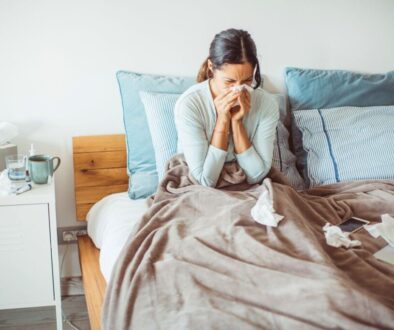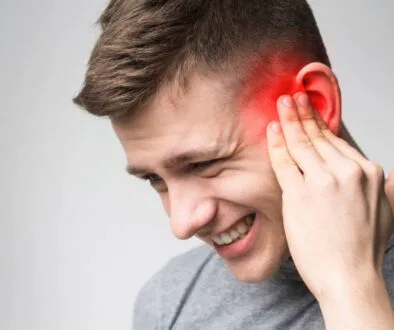Why Does My Ear Hurt When I Chew? Possible Causes
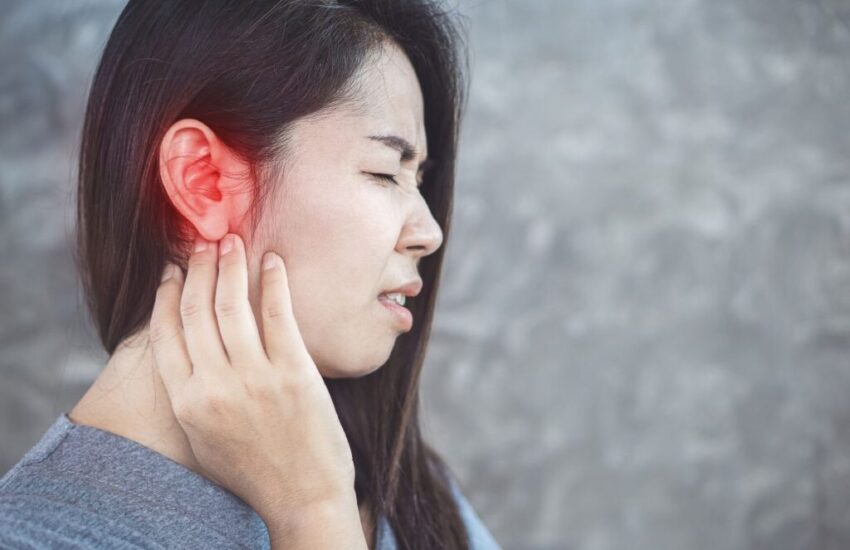
Published May 15, 2024
Ear pain while chewing is very disruptive, which shows the importance of finding its cause. Such discomfort may come from a TMJ dysfunction or an ear infection. Each has unique causes and needs specific treatments.
In this article, we’ll explore the potential causes of ear pain during chewing and discuss strategies for mitigating this discomfort.
Exploring The Link: Why Does My Ear Hurt When I Chew?
Why does my ear hurts when I chew? Many people ask this question when experiencing unexpected discomfort. Ear pain while chewing may be due to TMJ or an ear infection. Temporomandibular joint disorder (TMJ) affects the jaw joint and the muscles around it.
The close connection between the jaw joint and the ear canal allows problems in one area to readily affect the other. Sadly, this causes symptoms such as ear pain and headaches. It also triggers discomfort in the neck and shoulders and limits jaw movement, among other things.
Distinguishing Between TMJ Or Ear Infection
Determining whether pain stems from TMJ dysfunction or an ear infection is crucial for proper treatment. TMJ dysfunction presents with jaw-related symptoms, including challenges opening the mouth or a clicking sound. Most ear infections present with symptoms such as fever, ear discharge, hearing loss, and a feeling of fullness in the ear. Recognizing these symptoms is crucial as they guide individuals to the correct diagnosis and treatment plan.
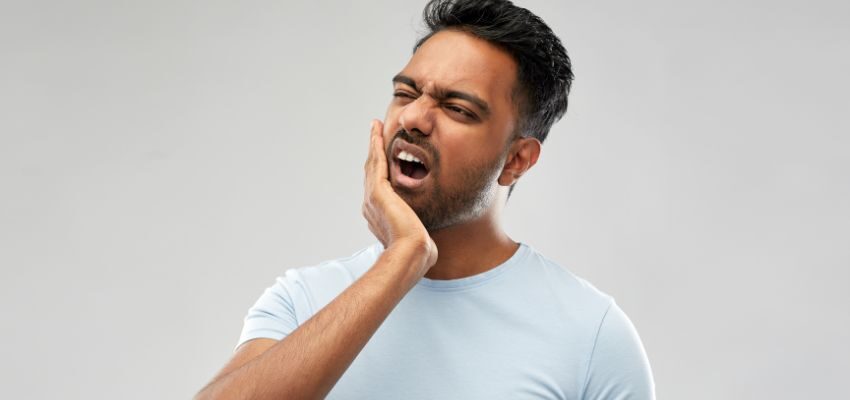
Possible Causes Of Ear Pain While Chewing
TMJ dysfunction often stands out as a significant cause of ear pain while chewing due to its proximity to the ear canal. However, several other factors can also contribute to this discomfort. Here’s a brief look at the most prevalent causes:
- Teeth grinding (bruxism). Regular grinding or teeth clenching can exert undue pressure on the jaw joints, often resulting in TMJ discomfort and, by extension, ear pain.
- Arthritis. Rheumatoid arthritis or osteoarthritis affecting the TMJ can wear down the cartilage, causing friction and inflammation. Because of the close anatomical relationship, it also leads to ear pain.
- Ear infections (otitis media). Ear infections can cause fluid buildup. This causes pressure and pain. The pain can get worse during chewing or yawning.
- Eustachian tube dysfunction. This tube plays a crucial role in maintaining ear pressure. Any Eustachian tube dysfunction or blockage can cause fullness and discomfort in the ear, especially when swallowing or chewing.
- Dental issues. Problems such as impacted wisdom teeth, cavities, or abscesses can extend pain to the jaw and ears. Chewing can aggravate this pain due to the extra pressure on the affected teeth.
- Weak jaw muscles. Weak jaw muscles can cause chewing problems and jaw and ear pain. The weakness can be from misuse or health conditions. Physical therapy can be beneficial in strengthening these muscles and reducing symptoms.
Identifying the cause of ear pain during chewing is vital for an effective treatment plan. Consulting with healthcare professionals can lead to accurate diagnosis and tailored treatments.
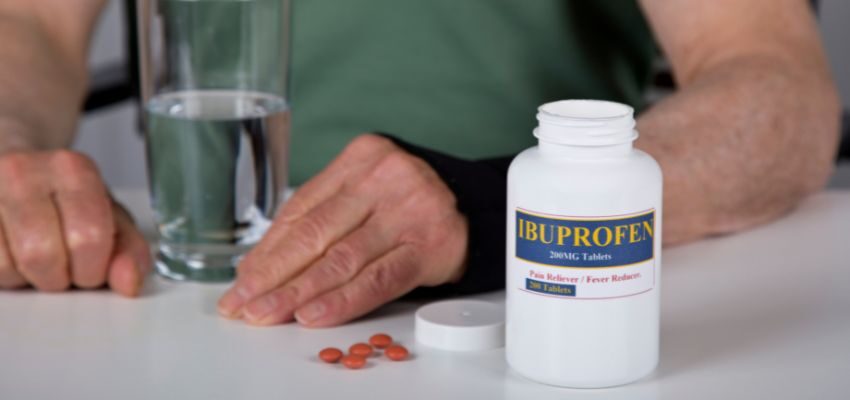
Strategies To Alleviate Ear Pain During Chewing
Addressing ear pain linked to chewing involves a range of measures. They aim to reduce inflammation, support the jaw, and improve muscle function.
- Alternating hot and cold therapy. Switch between warmth to boost blood flow. Then, cold is used to numb the pain and reduce swelling. This can effectively lessen inflammation and pain. Use a warm compress and a cold pack for optimal results.
- Pain relief with over-the-counter medications. Ibuprofen and other nonsteroidal anti-inflammatory drugs (NSAIDs) are beneficial in managing pain and reducing inflammation. Adhere to recommended dosages and seek medical advice when necessary.
- Targeted jaw exercises and stretching. Implementing soft jaw muscle strengthening exercises, enhancing mobility, and alleviating tension through methods like chin tucks, mouth stretches, and relaxation techniques can be beneficial. Consult a physical therapist for tailored exercises.
- Dietary adjustments. Embracing a soft or liquid diet can temporarily ease jaw strain, allowing inflamed tissues to recover. Avoid hard-to-chew foods such as candies, nuts, and raw vegetables.
- Mindful chewing practices. Chewing softly and uniformly on both sides helps equalize pressure and minimize strain. Refrain from chewing gum and biting non-food items to prevent extra jaw tension.
- Managing stress. Addressing stress, which often leads to involuntary jaw clenching or teeth grinding, is crucial. Employ deep breathing, meditation, and yoga to mitigate stress and its physical manifestations.
- Role of mouth guards. Dentists recommend mouthguards. They can protect people who grind their teeth at night. Wearing one helps mitigate jaw stress and protect the teeth.
- Probiotics. Incorporating probiotic supplements into one’s routine could serve as a preventive strategy to reduce the risk of ear infections.
- Professional healthcare consultation. Persistent ear pain while chewing warrants a healthcare provider’s evaluation to pinpoint and treat the root cause.
Using these strategies together can significantly reduce ear pain from chewing, improving overall well-being.
Finding Relief: Strategies For Ear Pain When Chewing
In a scenario—ear hurts when I chew—it can diminish one’s quality of life. However, understanding its primary causes, such as TMJ or ear infection, gives individuals the necessary insight to pursue effective treatment. Individuals can manage the discomfort well by using practical tactics and asking healthcare professionals for advice.
Benefit From The Latest Advancements In Probiotic Science With Bionaze
Bionaze is a proprietary blend of probiotics proven to promote ear, nose, and throat health, improve digestion, and support your immune system. The active ingredients BLIS K12, and BL-04 are considered among the best probiotics according to science.
Get 25% Off Your First Order when you use BIO25 at checkout!

This Content Has Been Reviewed For Factual Accuracy
This content has undergone thorough fact-checking by our team of internal experts. Learn more about the meticulous editorial standard for our website here.
ADVERTISEMENT

About The Author
Hi, I’m Corinne Grace, a proud nursing graduate from Riverside College with a flair for writing. I specialize in health and wellness topics, using my educational background to weave informative and attention-grabbing articles that appeal to a wide variety of readers. Committed to excellence in writing, I’m always refining my skills to stay in sync with the fast-evolving world of digital media. Whether you’re seeking to understand complex health concepts or looking for relatable advice, I’m here to deliver content that’s accurate and enjoyable to read.


